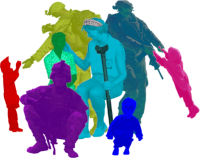Organizations dedicated to combating these heinous crimes rely heavily on the support of volunteers. Volunteers not only provide essential manpower but also bring diverse skills, perspectives, and passion to the cause. This webpage explores various ways organizations engage volunteers in their fight against child trafficking and human slavery, highlighting opportunities for individuals to make a meaningful impact.
 Awareness Campaigns
Awareness Campaigns
One of the primary ways organizations utilize volunteers is through awareness campaigns. These campaigns aim to educate the public about the realities of child trafficking and human slavery. Volunteers can help by:
- Distributing Educational Materials: Volunteers can distribute flyers, brochures, and other educational materials in their communities to raise awareness.
- Organizing Events: Many organizations host events such as workshops, seminars, or community gatherings where volunteers can assist with planning, logistics, and outreach.
- Social Media Advocacy: Volunteers can leverage social media platforms to share information, stories, and resources related to child trafficking, helping to reach a wider audience.
 Fundraising Initiatives
Fundraising Initiatives
Funding is crucial for organizations working against child trafficking and human slavery. Volunteers play a vital role in fundraising efforts by:
- Planning Fundraising Events: Volunteers can organize events like charity runs, auctions, or benefit concerts that raise money for anti-trafficking initiatives.
- Grant Writing Assistance: Some volunteers may have experience in writing grants or proposals that can secure funding from foundations or government sources.
- Online Crowdfunding Campaigns: Volunteers can help set up and promote crowdfunding campaigns through platforms like GoFundMe or Kickstarter.
 Direct Support Services
Direct Support Services
Organizations often provide direct support services to victims of trafficking. Volunteers may assist in various capacities:
- Mentorship Programs: Trained volunteers can mentor survivors of trafficking, providing guidance and emotional support as they reintegrate into society.
- Crisis Response Teams: Some organizations deploy volunteer crisis response teams that assist during emergencies involving victims of trafficking.
- Legal Assistance: Volunteers with legal expertise may offer pro bono services to help victims navigate the legal system.
 Advocacy and Policy Work
Advocacy and Policy Work
Volunteers are essential in advocacy efforts aimed at influencing policy changes related to child trafficking and human slavery:
- Lobbying Efforts: Volunteers can participate in lobbying activities at local or national levels to advocate for stronger laws against trafficking.
- Research Projects: Some organizations involve volunteers in research projects that gather data on trafficking trends or evaluate existing programs’ effectiveness.
- Public Speaking Engagements: Experienced volunteers may represent the organization at conferences or community meetings to share insights about their work.
 Training and Capacity Building
Training and Capacity Building
Training programs are crucial for equipping both volunteers and staff with the necessary skills to combat trafficking effectively:
- Workshops for Volunteers: Organizations often conduct workshops that train volunteers on recognizing signs of trafficking, understanding victim needs, and effective intervention strategies.
- Skill Development Programs: Some organizations offer skill development programs where volunteers learn specific skills relevant to anti-trafficking work (e.g., counseling techniques).
Join Us!
If you are passionate about making a difference in the fight against child trafficking and human slavery, we invite you to join our team of dedicated volunteers! Whether you have time for a few hours a week or want to commit more significantly, there are numerous opportunities available for you to contribute your skills and passion toward this critical cause. Together, we can create lasting change!
